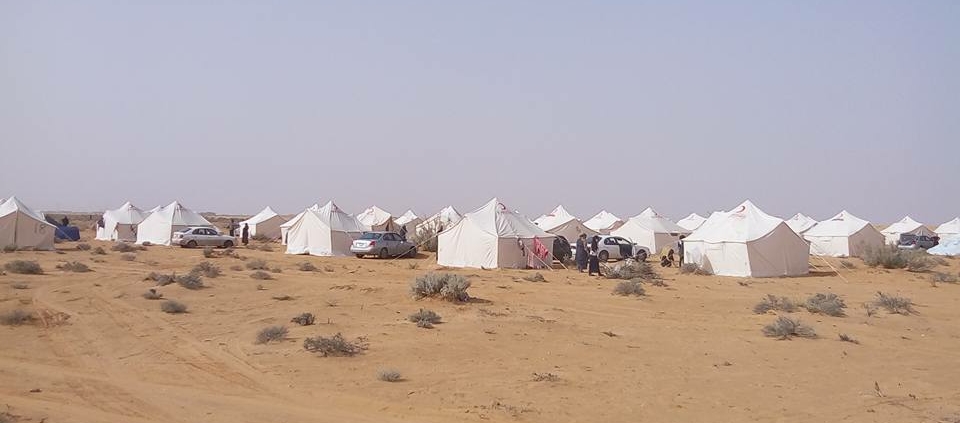Libyan human rights organizations condemn the forced eviction of Tawerghans and call on the Libyan authorities for a permanent solution
Libyan human rights organizations condemn the forced eviction of Tawerghans and call on the Libyan authorities for a permanent solution that ends their suffering and includes reparation and accountability for the violations committed against them
Press release
The undersigned Libyan human rights organizations express their strong condemnation and denunciation of the forced eviction operation carried out by the Stabilization Support Agency on May 3 against the displaced Tawerghans residing in Al Falah Camp 1 and Al Falah Camp 2 in the center of the capital, Tripoli. This resulted in the displacement of about 530 families, as the first camp was inhabited by about 360 families and the second by about 170 families. The organizations condemn the continuation of the systematic unfair policies and practices that exacerbate the suffering of the displaced Tawerghans, which began in 2011, due to the absence of the political will of all successive governments since the revolution to stop the continuous displacement and the forced movement of citizens throughout the country and hold the perpetrators of grave violations against the displaced accountable.
On the first of May, six cars bearing the emblem of the Stabilization Support Agency stormed the two camps at ten o’clock in the evening, and the staff of the agency asked the people to leave the two camps and evacuate them no later than May 3 (the second day of Eid al-Fitr). They warn the people of the consequences if they did not comply with these orders. On May 2, the Stabilization Support Agency sent some of its men to the two camps to make sure that the people began preparing to carry out an evacuation. On the day specified for the forced eviction, Stabilization Support Vehicles, accompanied by a Central Security vehicle, were stationed at the entrance to the two camps. Cars and residents were prevented from entering, and the residents were forced to leave. 38 families out of a total of 530 have returned to Tawergha, while the rest of the families are still displaced in the suburbs of Tripoli, Tarhuna, Bani Walid, Souk al-Sabt, Souk al-Ahad, al-Sbai’a and Wadi al-Rabi’.
Moreover, the Attorney General had issued a decision on March 7, 2022, to vacate the houses of the Islamic Call Society inhabited by displaced people from Tawergha, no later than March 26, 2022. But as a result of the negotiations conducted by the displaced people residing in those housing with the Board of Directors of the Islamic Call Society, the period of forced eviction has been extended to the first week after Eid al-Fitr. The deadline has expired, while the people threatened with forced eviction are still negotiating in order to reach an agreement that will save them from the fate of homelessness.
The number of displaced people in Libya is about 278,000 people, including about 40,000 people from Tawergha, whose tragedy began in 2011. Despite the signing of an agreement for return and compensation in March 2017, and the Presidential Council’s issuance in December of the same year of a decision to begin the return of the displaced people to their city starting from the beginning of February 2018, the people who tried to return to their homes at that time were prevented from doing so. More than 5 years after the return and compensation agreement, and 4 years after the decision to open the city for return, the people have not received compensation, and the city still lacks the basic services that must be provided to enable the residents to live in it. This makes returning to Tawergha a bitter option for the people who want to return home but are unable to do so due to the authorities’ reluctance to provide basic services in the city.
In its report issued in October 2021, the Independent Fact-Finding Mission on Libya confirmed that the conditions for return to Tawergha are “not fulfilled,” and that the internally displaced Tawerghans face difficult living conditions in the camps, and do not have access to adequate services such as medical care, food, water, and sanitation. Children’s education opportunities are limited, as well as their exposure to violence which is encouraged by the state’s silence and acceptance of violations against the residents of Tawergha and its failure to take the necessary measures to compensate them and return them safely to their homes. The mission also considered that the residents of Tawerghans are subjected to persecution because acts of violence are practiced against them motivated by discrimination, and the mission reached a disturbing conclusion, as it believes that “Libya may be unable to guarantee the rights of internally displaced persons from Tawerghans under international law.”
The undersigned organizations, while calling on the Libyan authorities to stop the forced evictions of the people of Tawerghans in all the camps and the places they live in far from their homes, stress the need to take the necessary measures to end the collective punishment against the Tawerghans, rebuild their city, provide all basic services in it, and facilitate the means for safe voluntary return and reparation for damage caused by their displacement. It also calls on the authorities to prevent the security services and affiliated armed groups from raiding the camps for the displaced from Tawergha and stop frightening them or forcing them to leave. All basic services to camp residents must be provided and their life must be protected. In addition, all parties involved in violence against them must be face legal consequences and be accountable. It also calls on the United Nations Support Mission in Libya to put the crisis of the displaced from Tawergha on the agenda of discussions with the Libyan authorities and to ensure the seriousness of working to reach a permanent solution to it in the light of the above and in agreement with the people of Tawergha. Finally, the undersigned organizations call on the Libyan authorities, the United Nations Support Mission in Libya and all humanitarian organizations operating in Libya to provide humanitarian assistance to the people of Tawergha and all the displaced people in Libya.
Signing organizations:
- Defender Center for Human Rights
- Jurists Without Chains
- Libyan Crimes Watch
- Libya Al Mostakbal Centre for Media & Culture
- Washem Center for Women’s Studies
- Nuasi for gender studies
- Impact Platform
- Meras Organization
- Aman Organization Against Discrimination
- Libyan Women’s Platform for Peace
- Libyan Organization for Legal Aid




Trackbacks & Pingbacks
[…] from Tawergha whose tragedy began in 2011. Last May, the Stability Support Service carried out a forced eviction of the displaced from Tawergha residing in Al-Falah Camp 1 and Al-Falah Camp 2 in the center of the […]
Leave a Reply
Want to join the discussion?Feel free to contribute!